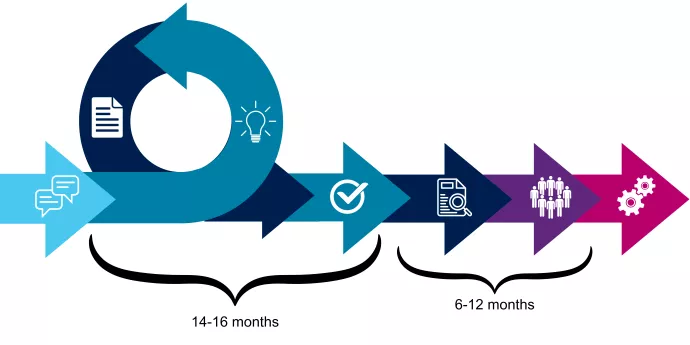Academic Change involves major modifications or additions to academic programming; these proposals are submitted as Expressions of Interest. Faculty interested in submitting a proposal for Academic Change should contact the Program & Curriculum Unit to receive detailed information about processes, timelines, templates, and resources.
Descriptions of the different types of Academic Change can be found below.
Expression of Interest for Significant Program Modifications
Chairs and Directors can submit an Expression of Interest using the official form when it is open in January 2026. Significant program modifications may include the following:
- new program development (Specialist, Major, Minor)
- redesign of an existing program or program learning outcomes (also known as major modifications)
- new certificate
- new focus
- adding UTMCIP (co-op) stream
- program closure
- new unit
2026 EOI Timeline
January 6, 2026: form opens
February 27, 2026: submissions due; form closes
March 2026: submissions reviewed
April 2026: decisions announced
The Program & Curriculum Unit will host an information session (PCU Café) on Wednesday, February 4, 2026 from 2:10-4:00 pm - RSVP online.
If you have any questions, please contact us at programcurriculum.utm@utoronto.ca.
New Programs & Degrees
At the undergraduate level, new degree programs include new specialists and majors that lead to either one of our existing four honours degrees or a brand new honours degree at UTM. At the graduate level, new degree programs can be professional programs as well as research-based masters or doctorates. No matter the level, the approval process for new degree programs are governed by the University of Toronto Quality Assurance Process (UTQAP), mandates an external appraisal, and requires governance as well as Quality Council approval. Additionally, for new graduate degree programs, new undergraduate degrees, and certain new undergraduate programs will required approval by the Ministry of Colleges & Universities (MCU).
Program Creation
This graphic provides an overview of the process for creating a new program. Please note that each Academic Change process is unique and may require fewer or additional steps.

Consultation
- Information sessions
- Expression of Interest

Development
- Fill out Outline
- Consultation meeting with the Vice-Provost, Academic Programs (VPAP)

Proposal
- Draft 1
- VPAP and PCU provide feedback
- Draft 2
- Decanal Broad Consultation
- Final Draft

Sign-Off
- Decanal sign-off
- Vice-Provost sign-off
- Provost Advisory Group approval

Review
- Site-visit by external reviewers
- Internal responses from the Academic Unit, Office of the Vice-Principal Academic & Dean (OVPAD), and VPAP

Governance
- Academic Affairs Committee
- Academic Policy & Programs Committee
- Quality Control/Ministry of Colleges and Universities

Implementation
- Once approved, the Office of the Registrar will publish program information in the Academic Calendar
- Plan for student enrolment and start of program

Major Modifications to Existing Programs
Proposals for major modifications involve significant changes to an existing program (graduate or undergraduate). Examples of major modifications include:
- The creation of a new major or specialist in an undergraduate program where there is already a specialist or major
- The introduction of a new field/ concentration within an existing graduate degree program
- The introduction of a new stream within an undergraduate program
- The creation of a new freestanding minor
- The development of a combined degree program
Major modifications are governed by the University of Toronto Quality Assurance Process (UTQAP). Final governance approval for major modification proposals is the UTM Academic Affairs Committee (AAC), with annual reporting to the Committee on Academic Policy & Programs (AP&P) as well as the Quality Council.
Program Closure
Program closures are a natural part of curriculum renewal and the evolution of an academic unit. Low enrolment, a change in the discipline, or a re-evaluation of the unit’s current academic offerings can be the impetus for program closures. The University of Toronto Quality Assurance Process (UTQAP) outlines a process for program closures, which includes an approval pathway that mirrors its original creation approval pathway.
Certificates
The University of Toronto offers three types of certificate programs that include for-credit and not-for-credit offerings. An additional Certificate of Completion/ Certificate of Attendance option is also available. Certificates are described in full in the Policy on Certificates (For-Credit and Not-For-Credit).
Category 1 and Category 2 certificates are for-credit and offered only at the undergraduate level. Whether taken as a stand-alone certificate program or in conjunction with a current undergraduate program, these are a coherent sequence of for-credit courses with assessments. These certificate proposals are approved by UTM’s Academic Affairs Committee (AAC) and reported annually to the Committee on Academic Policy & Programs (AP&P). They are also subject to periodic reviews under the University of Toronto Quality Assurance Process (UTQAP).
Category 3 certificates are for continuing, professional and/ or executive education and comprise a coherent sequence of not-for-credit courses, with a mechanism to assess student performance. Like the previous two certificate categories, Category 3 certificates are also approved by UTM AAC and reported annually to AP&P. Periodic reviews are conducted by the Office of the Dean.
Certificates of Completion/ Certificates of Attendance recognize continuing education activities for a wide range of participants (undergraduate, graduate, and non-registered UofT students). This divisional level, not-for-credit certificate does not involve assessment of participant performance. The Vice-Principal, Academic & Dean and Vice-Dean, Academic Programs review and approve all proposals for Certificates of Completion/ Certificates of Attendance, bringing approvals to UTM AAC for information.
Academic Units
At UTM, academic units include both departments and extra-departmental units (EDUs). Like changes to academic programs, academic unit creation, change (e.g. renaming or restructuring), and closures/ disestablishments are a natural result of our continuous cycle of improvement. Creation and changes to academic units require governance approval.
Academic units considering a change should consult with the Program & Curriculum Unit early in the development process.
Extra-Departmental Units (EDUs)
Extra-departmental units (EDUs) are flexible and multi-disciplinary entities organized around emerging research and teaching areas that span disciplines. EDU creation and operation follow the Guidelines for Extra-Departmental Units set out by the University of Toronto.
The scope of research and scholarly interest of an EDU is encapsulated within four categories (A, B, C, and D). Each EDU category differs in their ability to hold primary appointments, offer academic courses and programs, and administer research funds. They are also distinguished by their organizational structure, review requirements, and approval pathway. A full summary of the EDU categories can be found in the EDUs At-A-Glance resource document.




